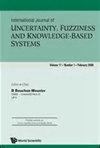Uncertainty Measures in Fuzzy Set-Valued Information Systems Based on Fuzzy β-Neighborhood Similarity Relations
IF 1
4区 计算机科学
Q4 COMPUTER SCIENCE, ARTIFICIAL INTELLIGENCE
International Journal of Uncertainty Fuzziness and Knowledge-Based Systems
Pub Date : 2023-08-01
DOI:10.1142/s0218488523500289
引用次数: 0
Abstract
Uncertainty measures are instrumental in describing the classification abilities in information systems, and uncertain information has been measured and processed with granular computing theory. While the fuzzy set-valued information system is a generalization of fuzzy information systems, the relationship between the information granulation and the uncertainty in fuzzy set-valued information systems remains to be studied. This paper probes into uncertainty measures in fuzzy set-valued information systems based on the fuzzy [Formula: see text]-neighborhood and the idea of granulation. Specifically, the fuzzy [Formula: see text]-neighborhood similarity relation that reflects the similarity between two objects is defined in terms of the nearness degree. We propose the concepts of information granules and granular structures induced by fuzzy [Formula: see text]-neighborhood similarity relations, based on which we introduce the granularity measures and rough approximation measures of granular structures in fuzzy set-valued information systems. Given the situation of decision information systems, we propose the granularity-based rough approximation measures by combining granularity measures with rough approximation measures. Experiment results and effectiveness analysis show that the measures we proposed are reasonable and feasible.基于模糊β-邻域相似关系的模糊集值信息系统的不确定性度量
不确定性测度是描述信息系统分类能力的重要手段,利用颗粒计算理论对不确定性信息进行测度和处理。虽然模糊集值信息系统是模糊信息系统的泛化,但模糊集值信息系统中信息粒化与不确定性之间的关系仍有待研究。本文基于模糊[公式:见文]邻域和粒化思想,探讨了模糊集值信息系统中的不确定性测度。具体来说,用接近度来定义反映两个对象之间相似度的模糊[公式:见文]-邻域相似关系。提出了模糊[公式:见文]邻域相似关系诱导的信息颗粒和颗粒结构的概念,并在此基础上引入了模糊集值信息系统中颗粒结构的粒度度量和粗逼近度量。针对决策信息系统的实际情况,将粒度测度与粗逼近测度相结合,提出了基于粒度的粗逼近测度。实验结果和有效性分析表明,所提出的措施是合理可行的。
本文章由计算机程序翻译,如有差异,请以英文原文为准。
求助全文
约1分钟内获得全文
求助全文
来源期刊
CiteScore
2.70
自引率
0.00%
发文量
48
审稿时长
13.5 months
期刊介绍:
The International Journal of Uncertainty, Fuzziness and Knowledge-Based Systems is a forum for research on various methodologies for the management of imprecise, vague, uncertain or incomplete information. The aim of the journal is to promote theoretical or methodological works dealing with all kinds of methods to represent and manipulate imperfectly described pieces of knowledge, excluding results on pure mathematics or simple applications of existing theoretical results. It is published bimonthly, with worldwide distribution to researchers, engineers, decision-makers, and educators.

 求助内容:
求助内容: 应助结果提醒方式:
应助结果提醒方式:


